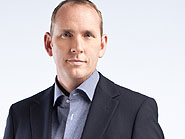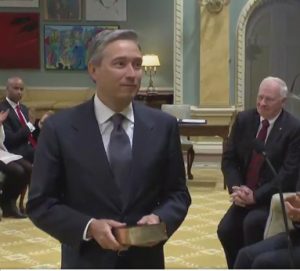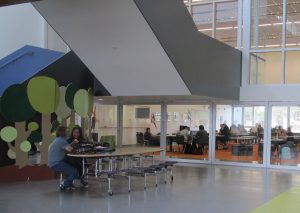ARCHIVE – BC & NATIONAL BREAKING NEWS – January 2017
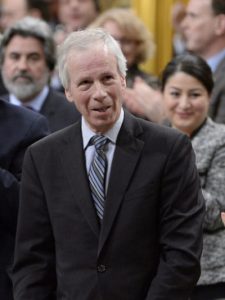 Tuesday, January 31 ~ OTTAWA. Prime Minister Justin Trudeau today announced that he will be proposing the Honourable Stéphane Dion to the European Union and the German government as Canada’s Ambassador to the European Union and Germany.
Tuesday, January 31 ~ OTTAWA. Prime Minister Justin Trudeau today announced that he will be proposing the Honourable Stéphane Dion to the European Union and the German government as Canada’s Ambassador to the European Union and Germany.
“As the senior Canadian diplomat in Europe, Mr. Dion will play a central role in advancing Canada’s interests, ensuring coherence across the activities of Canadian missions and providing strategic guidance to the Prime Minister” it was stated in a Prime Minister’s Office news release today. “Dion’s position will be an enormous strategic benefit for Canada. He will engage with European partners at the highest levels on behalf of the Government of Canada, spending his time in both Brussels and Berlin.”
“Stéphane’s commitment to Canada knows few parallels, and I am grateful he has agreed to undertake this unique and important task. As Canada’s senior voice in Europe, I know he will continue to serve his country in an extraordinary way and help deepen Canada’s enduring relations with Europe,” said Trudeau in a news release today.
 Monday, January 30 ~ VICTORIA. BC Parks featured on licence plates. The BC government continues to encourage the purchase of BC Parks vehicle licence plates at Autoplan broker offices, and show their support for provincial parks through images of a Kermode Bear, Purcell Mountains or scenic Porteau Cove.
Monday, January 30 ~ VICTORIA. BC Parks featured on licence plates. The BC government continues to encourage the purchase of BC Parks vehicle licence plates at Autoplan broker offices, and show their support for provincial parks through images of a Kermode Bear, Purcell Mountains or scenic Porteau Cove.
In partnership with the Insurance Corporation of British Columbia, the specialty licence plates were unveiled by Environment Minister Mary Polak and Transportation and Infrastructure Minister Todd Stone in Vancouver earlier this month.
The licence plates allow motorists to show their support, while ensuring BC Parks has additional funds to invest in new programs and
improvements.
All net proceeds from the sale and ongoing renewals of BC Parks licence plates will be re-invested back into provincial parks through the Park Enhancement Fund, a transparent account where revenues enhance programs or services in provincial parks beyond the core services provided by government.
The BC Parks specialty plates cost $50 for the initial purchase, and $40 for each annual renewal. The licence plates all depict
scenes from BC’s parks and recreation areas:
- The Kermode Bear, a rare subspecies of black bear found only in British Columbia;
- The Purcell Mountains, which make up the natural backdrop of the Purcell Wilderness Conservancy Provincial Park and Protected Area, spanning north to Bugaboo Provincial Park in the interior region, and
- Porteau Cove, a picturesque view overlooking Howe Sound from the popular waterfront Porteau Cove Provincial Park along the South Coast.
The new specialty plates are part of the BC Parks Future Strategy, announced by Premier Christy Clark on November 28, 2016. Within the
strategy, the Province is investing $22.9 million to build 1,900 new campsites, is seeding a new BC Parks Foundation with a $5-million
endowment, and will be allocating funding in 2017 for other recreation and conservation initiatives, including hiring more park rangers.
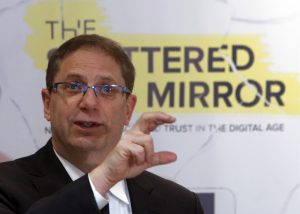
Edward Greenspon presented his report on January 26, 2017
Friday, January 27 ~ NATIONAL. A proposed ‘Future of Journalism and Democracy Fund’ of $300 to $400 million would support digital innovation, civic journalism, local news media and indigenous reporting.
That is part of a 103-page report The Shattered Mirror: News, Democracy and Trust in the Digital Age written by long-time journalist Edward Greenspon and published by the Public Policy Forum, that outlines the significant fall in revenues for traditional media over the past several years. Cuts to newsrooms across the country are highlighted.
The report also calls for a sales tax on foreign companies selling digital subscriptions or ads in Canada and other tax measures that would provide a Future of Journalism and Democracy fund with $300 to $400 million a year, designed to support local and indigenous news, along with research on the role of news in society. The fund would start with $100 million in federal cash as seed money.
The report also recommends a new mandate for The Canadian Press, the country’s national news service, to make further investments in local reporting across the country.
Greenspon said the recommendations are meant to improve democracy and the information needed for civic engagement, rather than bailing out any one business model. By kick-starting a policy debate now, the idea is that remedies to the flailing local news industry could be laid out in the 2018 federal budget.
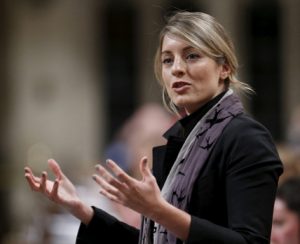
Heritage Minister Melanie Joly ordered the study
A spokesperson for Heritage Minister Mélanie Joly, who ordered the study, said the government would be reviewing the recommendations but cautioned that it was “too early to speculate on possible policy outcomes.
Among the issues pointed out in the report — at present if ads are purchased on non-Canadian mega-sites likes Facebook and Google, the Canadian purchaser is not required to pay sales tax. That includes the federal government that has chosen to market with those and other online platforms while drying up their ad purchases with local and regional newspapers.
The dismantling of traditional news outlets – particularly the editorial newsrooms — would imperil the health of Canadian democracy, Greenspon said in presenting the report Thursday. Most national TV and print/online media are covering the story.
A shared base of knowledge and understanding is key to an empowered electorate says the report. That premise has been the mainstay of this newspaper West Shore Voice News since its inception in 2011 (formerly Sooke Voice News) with a goal to serve a knowledge-based economy and provide insights into areas of society that contribute to successful living: health and wellness, education, business and the economy, technology, politics, and socioeconomic trends.
The Shattered Mirror report pulls no punches about the rapidly changing landscape in Canadian media that has cost journalists their jobs and communities their newspapers. Most notably in recent years, media mogul Postmedia has carved away at its own newsrooms, but leaving management still standing. Until this week, when their Chief Financial Officer said he would be leaving.
In his On the Money business news show on CBC last night, journalist Peter Armstrong pushed Postmedia CEO Paul Godfrey to defend how he could receive a $900,000 bonus in the wake of severing many long-time experienced journalists and editors from his staff roster. Godfrey said that it was important to have a management team in place as ‘insurance’ to the appeal of potential investors.
The Toronto Star reports that Postmedia issued layoff notices earlier this week to 15 employees at the Ottawa Citizen, Montreal Gazette and Windsor Star after the company failed to reach the salary reduction target it set for itself last fall. And in January 2016 two top editors at the Edmonton Journal (Margo Goodhand and Stephanie Coombs) were among 35 staff let go there by Postmedia (of a total 90 Postmedia job layoffs, or 8% of Postmedia’s editorial staff) during a merger of four newspapers in Edmonton, Calgary, Ottawa and Vancouver. “In those four markets, each of those newsrooms are combining into one newsroom for each market,” said a Postmedia representative at that time. This served to assist Postmedia in their financial difficulties as they aimed to find at least $80 million in savings before the fiscal end of 2017 but also diminished the up-close coverage of local politics and events.
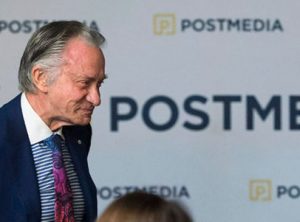
Postmedia CEO Paul Godfrey
In collecting up and pushing out smaller players in the newspaper industry, Postmedia has systematically played a large role in endangering the well-being of smaller newspapers in communities across Canada. In their aim to be a big financial player in the media marketplace they may well have set in motion the demise of a fundamental plank of Canadian society — an open, productive and investigative journalism profession upon which society relies for reliable reporting through small local newspapers in particular.
In response to the report: “We at CWA (Communication Workers of America media union) Canada have been urging this for some time in order to encourage local, non-profit ownership of newspapers rather than the destructive, predatory hedge fund disaster that is Postmedia,” CWA president Martin O’Hanlon said in a statement yesterday.
Godfrey started expansive growth of his media empire in Victoria, BC just as the Internet age was progressing in the mid 1990s, including jumping onto the e-commerce bandwagon in its early days.
Although the Canadian Broadcasting Corporation (CBC) is arguably the most reliable and impartial producer of in-depth news in Canada, the report essentially recommended tying the hands of the CBC. The report recommends that the government-funded CBC should be required to share its news content with other organizations and not be allowed to sell digital ads. In other words, not compete with the private market.
The West Shore Voice News editorial on this topic is on page 2 in the January 27, 2017 issue.
Thursday, January 26 ~ Free Trade, Rural Canada and How to keep Canada from being Trumped ~ Op Ed submitted by Jan Slomp, President of the National Farmers Union. He farms near Courtenay, BC
 Over the decades since the Canada-US Free Trade Agreement (FTA) and later, NAFTA, was signed, Canadian agriculture has undergone a significant shift. There was once a multitude of diverse local and regional economic drivers, but now we have a “one size fits all” export-driven, low-priced commodity production model. Farm capital needs have sky-rocketed as illustrated by the massive $90 billion farm debt. Off-farm investors control more and more of Canada’s farmland. Production – per farm, per acre and per worker — continues to go up. And that production became increasingly export and transport dependent as NAFTA-driven deregulation accelerated consolidation and transnational ownership of handling and processing facilities. Farmer numbers are ominously declining, yet governments, and most farm commodity groups and agri-business corporations remain euphoric over each signed trade agreement and growing exports.
Over the decades since the Canada-US Free Trade Agreement (FTA) and later, NAFTA, was signed, Canadian agriculture has undergone a significant shift. There was once a multitude of diverse local and regional economic drivers, but now we have a “one size fits all” export-driven, low-priced commodity production model. Farm capital needs have sky-rocketed as illustrated by the massive $90 billion farm debt. Off-farm investors control more and more of Canada’s farmland. Production – per farm, per acre and per worker — continues to go up. And that production became increasingly export and transport dependent as NAFTA-driven deregulation accelerated consolidation and transnational ownership of handling and processing facilities. Farmer numbers are ominously declining, yet governments, and most farm commodity groups and agri-business corporations remain euphoric over each signed trade agreement and growing exports.
What is missing in this picture is a few very sobering facts.
The once mighty farmer cooperative handlers and processors have been dismantled and absorbed into a handful of transnational corporations. Eighty percent of Vancouver’s terminal capacity used to be owned and operated by prairie Pools. Now the private trade owns it all. With the Canadian Wheat Board gone there is no real economic participation by farmers beyond the farm gate, nor any referee to discipline the railroads. Prairie farmers, who once ran the majority of Canada’s grain industry, no longer have a direct connection to the customers and end-users that pay the real market value for their product.
Under NAFTA, Canada’s regulatory system facilitated North American integration of pork and beef slaughter, processing and marketing at the expense of regional and local processors, marketers and the jobs they provided. Despite trade agreements, Canadian exports are still disadvantaged due to transportation costs
Apart from supply management sectors and a brief spike after 2009, overall inflation-adjusted net farm income is dismal. Farm communities across Canada are suffering from chronic economic decline. This was camouflaged by off-farm manufacturing jobs in Central Canada and resource sector jobs in Western Canada, but those jobs are no longer easy to get. The decline of Canada’s rural economy is not often discussed, but four decades of loss — of elevators, rail service, machinery dealerships, manufacturing, processing, input suppliers, essential community services and retailing outlets — has steadily diminished the quality of rural life. Government cutbacks to agricultural research facilities, public plant breeding, the PFRA and government extension services have further aggravated prospects. The decline of rural Canada is stark and given little attention compared to the rural quality of life in other developed countries.
Canada’s growing dependence on food imports is another sobering fact. We can grow many of these products, but have lost our own market because trade agreements help integrated food companies operate across borders, depressing prices for producers while controlling the consumer price. Trade agreements also reward over-processing of foods by substituting basic ingredients with cheaper fats, vegetable oils, soy lecithin, corn starch, fructose and modified milk ingredients, hence North America’s infamous over-consumption of processed foods. If free trade facilitates efficiency, as claimed, why is the spread between prices at the farm gate and the grocery store constantly getting larger?
President Trump vilifies Mexico for the loss of US jobs, but fails to mention the American companies that flocked to the Mexican maquiladoras to take advantage of low labour and environmental standards. NAFTA allowed the US to flood Mexico with its heavily subsidized corn, pork, chicken, beef and dairy, destroying the livelihoods of millions of Mexican farmers. Many subsequently migrated (often illegally) to become super-exploited labour in American fields, factories and meat packing plants.
President Trump will likely find reasons to reject Canadian product coming across the border, so it is very important that Prime Minister Trudeau is prepared for the worst and applies the utmost diplomacy in dealing with the Trump administration.
It is important to understand that NAFTA was never the golden egg its promoters pretended it to be, and neither are the other free trade agreements signed since. NAFTA has caused a lot of damage to the Canadian rural economy and President Trump is likely going to add more trouble. The last thing rural Canada needs is more giveaways to the US in an attempt to persuade the Americans not to back out of the deal. It is time for our Prime Minister to stop trading away the livelihoods of Canadian farmers and to start repairing the damage these deals have done so our domestic and international markets can function in a way that will make farming profitable again.
The decline of the Canadian rural economy must be turned around. If Prime Minister Trudeau wants to prevent the election of a Trump-like Canadian leader in three years he will have to start fixing things in rural Canada. We need an agenda for agriculture that makes rural quality of life and viable family farms the priority.
 Tuesday, January 24 ~ VICTORIA. Nominations are now open for the Order of British Columbia, the Province’s highest honour for individuals who have served with great distinction or excelled in any field.
Tuesday, January 24 ~ VICTORIA. Nominations are now open for the Order of British Columbia, the Province’s highest honour for individuals who have served with great distinction or excelled in any field.
British Columbians are encouraged to consider and nominate inspiring individuals who have left a lasting legacy in their respective fields. The Order of British Columbia is one way of rewarding and recognizing those British Columbians whose extraordinary contributions and achievements have contributed to a better quality of life in the province and beyond.
“As the Province’s highest honour, the Order of British Columbia recognizes the outstanding contributions and achievements of our citizens,” said Judith Guichon, Lieutenant Governor and Chancellor of the Order of British Columbia. “I encourage you to nominate those individuals in your community whose leadership, dedication and extraordinary accomplishments strengthen the integrity of our province and contribute to a better future for all.”
Since the Order of British Columbia was established in 1989, the Province has recognized 402 British Columbians from a variety of sectors including the business, volunteer, arts and sporting communities.
Anyone can submit a nomination. Each year nominations are due on the first Friday of March, so for this year that is March 3, 2017. More information, nomination forms and submission instructions are available online at www.orderofbc.gov.bc.ca, by email: bchonoursandawards@gov.bc.ca, or by phone 250 387-1616.
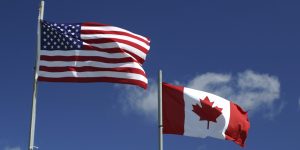 Friday, January 20 ~ OTTAWA. Prime Minister, Justin Trudeau today issued the following statement on the inauguration of Donald J. Trump as President of the United States of America:
Friday, January 20 ~ OTTAWA. Prime Minister, Justin Trudeau today issued the following statement on the inauguration of Donald J. Trump as President of the United States of America:
“On behalf of the Government of Canada, I would like to extend my congratulations to Donald J. Trump on his inauguration as 45th President of the United States of America.
“Canada and the United States have built one of the closest relationships between any two countries in the world. This enduring partnership is essential to our shared prosperity and security.
“Together, we benefit from robust trade and investment ties, and integrated economies, that support millions of Canadian and American jobs. We both want to build economies where the middle class, and those working hard to join it, have a fair shot at success.
“Canada and the United States have unparalleled cooperation on matters of national security, and have always worked side by side to protect our citizens and ensure our shared border is secure.
“We look forward to working with President Trump, the U.S. Administration, the 115th Congress, and officials at the state and local levels to restore prosperity to the middle class on both sides of the border, and to create a safer and more peaceful world.”
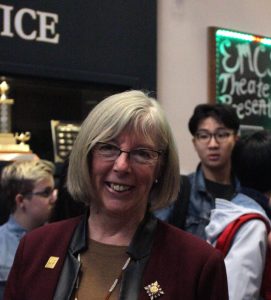
BC Lieutenant Governor Judith Guichon mingled with high school students at EMCS in Sooke, January 18. Photo by West Shore Voice News
Wednesday, January 18 ~ SOOKE. BC Lietenant Governor Judith Guichon launched a province-wide Canada 150 launch tour to visit all BC school districts, with a first stop at three schools in Sooke School District 62 (SD62) today.
SD62 provides education to students and families in a wide geographical area on the west side of south Vancouver Island, including Sooke, Langford, Colwood, Highlands, Metchosin, Juan de Fuca and Port Renfrew. Today’s three school visits by Her Honour were all in the town of Sooke itself.
First thing in the morning was a visit to Sooke Elementary School followed by a visit to Journey Middle School mid-morning. After lunch at the Sooke Legion, Lt Gov Guichon addressed a full auditorium of high school students at Edward Milne Community School (EMCS) in the afternoon. At each assembly, the Lieutenant Governor got Canada’s 150th Birthday off to an official start. Oh Canada was performed by two singers at the start, and a taped version of God Save the Queen wrapped up the assembly.
In her cheerful address to the high school students, Lieutenant Governor Guichon was a bit instructional (the role of the Lt Gov with relation to the crown and constitution, and the names of former BC Lieutenant Governors), a bit BC-promotional (with accolades for various BC regions and a pitch about various Government House ‘priority programs’), and a bit playful (including a ‘disqualification’ of VIPs in the front row to answer some of the questions that she pitched to the students).
She outlined the priority programs were outlined as Right to Read (including support for libraries in remote regions), Sing Me A Song (including a songwriting and performance contest with a $1,000 prize in each of three age categories), and Stewards of the Future (aimed primarily at Grade 10 students to promote leadership with land and water).
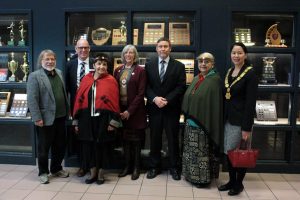 During the assembly Q&A, students asked Her Honour about her travel, how a Lt Gov is chosen and what the qualifications are, and how youth or the public might contribute suggestions to government or her office. The students seemed curious, intent and perhaps a bit surprised at aspects of Guichon’s skills and interests — that she owns a ranch, and that she has a 3-wheel electric vehicle that (when plugged into the power grid at her ranch) will cost nothing to recharge.
During the assembly Q&A, students asked Her Honour about her travel, how a Lt Gov is chosen and what the qualifications are, and how youth or the public might contribute suggestions to government or her office. The students seemed curious, intent and perhaps a bit surprised at aspects of Guichon’s skills and interests — that she owns a ranch, and that she has a 3-wheel electric vehicle that (when plugged into the power grid at her ranch) will cost nothing to recharge.
A formal group of VIPs attended the afternoon event, comprised of [in photo from left]: SD62 Board Chair Bob Phillips, SD62 Superintendent Jim Cambridge, T’Sou-ke Nation elder Shirley Alphonse, Lieutenant Governor Judith Guichon, EMCS Principal Pat Swinburnson, T’Sou-ke Nation elder Linda Bristol, and District of Sooke Mayor Maja Tait. Also in attendance were SD62 Trustee Margot Swinburnson and District of Sooke Councillor Bev Berger.
Students were advised by school administration before the formal event got started that all hats should be taken off, and all phones be turned off, with a reminder that they were representing their school. A bit motivationally they were told they represented “the west coast / best coast”.
After addressing the high school students, Lieutenant Governor Guichon seemed genuinely delighted to mingle with students in the lobby to answer further questions.
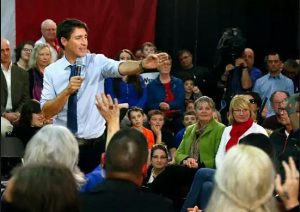 Sunday, January 15 ~ EDITORIAL. “When a rich kid from Ottawa/Montreal rolls up his sleeves and takes on the leadership of arguably the best country in the world, political pundits need to cut a bit of slack when petulance peeks out from behind the political correctness.
Sunday, January 15 ~ EDITORIAL. “When a rich kid from Ottawa/Montreal rolls up his sleeves and takes on the leadership of arguably the best country in the world, political pundits need to cut a bit of slack when petulance peeks out from behind the political correctness.
So Prime Minister Justin Trudeau took his family on a trip that few of us will ever be able to afford. And the trip was paid for by someone affiliated with an agency that lobbies the government, but is also a long-time family friend. They took a helicopter to a private island — how exotic! Would you turn down such a trip?
Notwithstanding some of the economic and political challenges that may lie ahead over some of Trudeau’s political decisions (like longstanding deficit spending, faltering on prompt delivery of democratic process reform, and what seemed like a casual threat to the oil industry in a town hall meeting this week), Canada is the coolest place on earth. No wars in our backyards, deliberate attention to matters of social well-being and environment, and a business sector that somehow wants to keep on trying in a flatline economy.
Thank your lucky stars and cut a break for people who devote themselves to public service when really they don’t have to.” ~ Editor, West Shore Voice News
[Editorial as first published on page 2 in the January 13, 2017 issue of West Shore Voice News | Photo screenshot from January 13 townhall meeting]
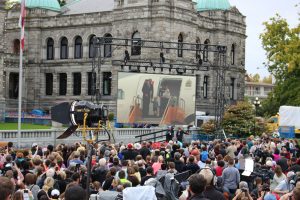
About 15,000 people gathered at the BC Legislature on Sept 24, 2016 for Royal Tour Official Welcome. Photo by West Shore Voice News
Thursday, January 12 ~ VICTORIA. The BC government released the costs today for the Royal Tour 2016, when their Royal Highnesses, the Duke and Duchess of Cambridge, and their children, visited British Columbia during their second official tour of Canada.
Through a cost sharing agreement with the Government of Canada, BC’s share of expenses relating to the Royal Tour 2016 totalled $613,363.93, which also includes the costs of site reconnaissance at each location as well as media transportation, accommodation, and tour.
The royal tour attracted global attention to BC with more than 435 accredited media, including 64 from United Kingdom outlets, and 31 from international outlets. Earned media coverage included media such as Vogue, Allure, Hello Magazine, CNN and the Today show with a reach of almost 106 million people.
From Sept. 24 to Oct. 1, 2016, the Duke and Duchess visited Victoria, Vancouver, Kelowna, Bella Bella and Haida Gwaii, attracting large crowds throughout their tour, including 15,000 British Columbians for their official welcome to Canada at the Parliament Buildings in Victoria.
Their Royal Highnesses also participated in more than 25 engagements, highlighting the significant work being undertaken to support parents with substance issues, enhance services and supports for mental health and conserving the Great Bear Rainforest.
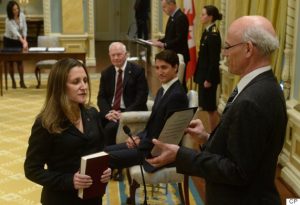
Chrystia Freeland is sworn in as Minister of Foreign Affairs as Prime Minister Justin Trudeau and Gov.-Gen. David Johnston look on during a ceremony at Rideau Hall in Ottawa, Tuesday, Jan.10, 2017. THE CANADIAN PRESS/Adrian Wyld
Tuesday, January 10 ~ OTTAWA. Prime Minister Justin Trudeau today announced a small but significant cabinet shuffle.
The most high profile shift is that former International Trade Minister Chrystia Freeland is now the Foreign Affairs Minister, and François-Philippe Champagne is now Minister of International Trade.
Freeland speaks fluent Russian and has deep ties in political administration in the United States having been a long-time journalist south of the border. François-Philippe Champagne — now leaving his post as Parliamentary Secretary to the Minister of Finance over the past year — is a skilled trade lawyer. These two appointments in particular are thought to be in response to toughening up Canada’s presence for interaction with the new Trump administration in the USA.
Outgoing Minister of Immigration John McCallum who skillfully and speedily handled the immigration of Syrian refugees to Canada last year, is taking a top diplomatic post as Canada’s Ambassador to China. Ahmed D. Hussen today becomes Minister of Immigration, Refugees and Citizenship; he is a first-time MP from the Greater Toronto area.
Patricia Hajdu is moving up from Minister of Status of Women to more influence with her posting to Minister of Employment, Workforce Development and Labour. While Maryam Monsef is generally thought to have poorly handled the voting reform issues as Minister of Democratic Institutions, she remains in the cabinet now as Minister of Status of Women.
And it looks like a possible swan song for long-time Liberal Stéphane Dion (serving in government since 1996) who has been offered international posts but may wish to remain in Montreal for family reasons (his wife is a businesswoman in Montreal). Katrina Gould is not yet widely known; she has been given the Democratic Institutions portfolio.
Here is the list as released from the Prime Minister’s office:
- Chrystia Freeland, currently Minister of International Trade, becomes Minister of Foreign Affairs, and retains the Canada-U.S. relations file, including trade relations.
- Maryam Monsef, currently Minister of Democratic Institutions, becomes Minister of Status of Women.
- Patricia A. Hajdu, currently Minister of Status of Women, becomes Minister of Employment, Workforce Development and Labour.
- François-Philippe Champagne, currently Parliamentary Secretary to the Minister of Finance, becomes Minister of International Trade.
- Karina Gould, currently Parliamentary Secretary to the Minister of International Development, becomes Minister of Democratic Institutions.
- Ahmed D. Hussen becomes Minister of Immigration, Refugees and Citizenship.
“The Honourable Stéphane Dion has served his country in many different roles over the last 21 years with integrity and a fierce love of Canada. I, and all Canadians, owe him a deep debt of gratitude for his service. I know I will be able to continue to count on his wisdom and his tireless service, and look forward to the next chapter of Mr. Dion’s contributions to our country.”
“The Honourable John McCallum has had a distinguished career in public service, holding many different portfolios within government and has had an extensive parliamentary career. Most recently, his work as Minister of Immigration, Refugees and Citizenship bringing in over 39,500 Syrian refugees has been an inspiration to Canadians and an example to the world. I am pleased to announce that I will be proposing the Honourable John McCallum to the Chinese government as Canada’s Ambassador to China. The Canada-China relationship will be well served by such a strong presence from our government.”
“The Honourable MaryAnn Mihychuk has served the government with distinction and oversaw a significant expansion of the Canada Summer Jobs program and settled the Canada Post labour dispute as Minister of Employment, Workforce Development and Labour. The Honourable MaryAnn Mihychuk will continue to serve as MP for Kildonan—St. Paul.”
Thursday, January 5 ~ BC. School Districts in British Columbia are in total receiving $50 million to hire more teachers for the remainder of the 2016-2017 school year.
BC Minister of Education Mike Bernier made the announcement today, explaining that it’s up to each school district in discussions with local BC Teachers Federation (BCTF) representatives, to determine what sorts of teacher or staff support hiring will be done with the additional 2016-2017 funds. Province-wide, the $50 million will allow for the hiring of about 1,100 teachers, said Bernier.
Bernier says that the $50 million announced today comes on top of the $5.1 billion already invested in public education in BC. The $50 million is a portion of what will finally be determined in negotiations between the BC Government and BCTF.
Most school districts already know where the needs are, so the additional funds are likely welcome. The funds will be included in the 2017 provincial budget (coming in February), and so will carry forward into hiring considerations for school boards in 2017-2018.
The funds issued at this time are in response to the Supreme Court of Canada decision that reversed a decision made by the BC Government in 2002 that effectively cut back on teachers and funds available for schools to operate over the past 15 years. Since 2002 the continued cutbacks have impacted not only the teachers but the entire delivery of education in BC, as school boards were obliged to find all available funding (including teacher salaries) from per-pupil funding ratio revenues and other miscellaneous revenue sources.
In Sooke School District 62 (SD62) — which serves families and students in Langford, Colwood, Sooke, Highlands, Metchosin, Juan de Fuca and Port Renfrew — about 14 teachers (full time equivalents) will likely be hired pending discussions with the Sooke Teachers Association on January 6, says SD62 Superintendent Jim Cambridge.
Cambridge says that in SD62 the additional funds will probably be used to hire additional secondary school teachers, as well as additional special needs support for the elementary schools. He identified those as top priorities. He also mentioned the options of hiring educational assistants (EAs), additional half-time teachers for full classrooms, teacher-librarians and counsellors.
 Sunday, January 1, 2017 ~ The first baby of 2107 born in British Columbia is Montgomery. He weighed in at 8 lbs 14 oz, arriving right at midnight at BC Women’s Hospital in Vancouver.
Sunday, January 1, 2017 ~ The first baby of 2107 born in British Columbia is Montgomery. He weighed in at 8 lbs 14 oz, arriving right at midnight at BC Women’s Hospital in Vancouver.
Information regarding the first birth of 2017 in BC was shared on the BC government Twitter account @BCGovNews today with congratulations to the family. Happy new year!

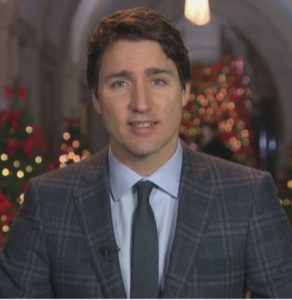 Saturday, December 31, 2016 ~ NATIONAL. Prime Minister Justin Trudeau has issued a New Year message to Canadians.
Saturday, December 31, 2016 ~ NATIONAL. Prime Minister Justin Trudeau has issued a New Year message to Canadians.
“Happy New Year, everyone. Tonight is 150 years in the making, and a once-in-a-lifetime opportunity to ring in the New Year together. From coast to coast to coast, spectacular events are planned to usher in Canada’s 150th birthday.
Before we leave 2016 behind, I want to thank you. Over the last year, we have accomplished a great deal together to strengthen the middle class and those working hard to join it.
We cut taxes on middle-class Canadians, and put more money in the pockets of nine out of ten families through a new, more generous Canada Child Benefit; we also signed one of the most progressive free trade deals in history that will benefit Canadians across the country.
As we mark Canada 150 over the next year, we will honour the generations of Canadians who have come together to create opportunities for one another. We will celebrate the courage and vision of those who came before us, and the hard work and ambition of Canadians – like you – who have made Canada the success story that it is today.
For my part as Prime Minister, I will always stand against the politics of fear and division, and focus on what brings us together – that is my New Year’s resolution to you.
In 2017, and beyond, our government will take further steps to help the middle class and those working hard to join it. And, together, I know we will continue to build the diverse and prosperous country that we are all so proud to call home. Canada, let’s make this year our year.
On behalf of our family, Sophie and I wish you a wonderful night and all the best in 2017.”
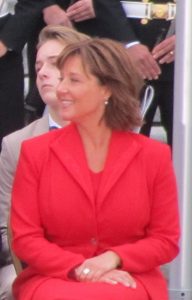
BC Premier Christy Clark at Sept 24, 2016 Official Welcome of the Duke & Duchess of Cambridge ~ Photo Copyright 2016: West Shore Voice News
Saturday, December 31, 2016. BC Premier Christy Clark has issued a New Year’s statement, on the eve of Canada’s 150th birthday.
“New Year’s celebrations give us a chance to spend time with our families, reflect back on the year that was, and prepare for the opportunities ahead.
“In many ways, 2016 was the year the country and the world took notice of what hard-working British Columbians are achieving by sticking to our plan. Together, we have built a solid foundation with Canada’s leading economy, the best job-creation record and lowest unemployment in the country.
“This means we are able to invest more in the future, and take care of those among us who need it most. That includes the largest single-year investment in affordable housing in Canada and strong steps to keep the dream of home ownership within the reach of the middle class with our new BC HOME Partnership Program.
“More than a decade of hard work has resulted in the landmark Great Bear Rainforest Agreement, recognized this year by Her Majesty Queen Elizabeth as part of the Queen’s Commonwealth Canopy.
“In the year ahead, we resolve to keep working every day to put British Columbians first, and to make sure BC is in a strong position to overcome any challenges and make the most of our opportunities.
“I want to wish all British Columbians a safe New Year’s celebration and all the best for a happy, healthy and prosperous 2017.”
 Friday, December 30 ~ WORLD. Time fix: At 11:59 pm & 59 seconds UT (3:59 pm PDT) December 31 the next second will be 11:59:60.
Friday, December 30 ~ WORLD. Time fix: At 11:59 pm & 59 seconds UT (3:59 pm PDT) December 31 the next second will be 11:59:60.
The New Year 2017 won’t start for another second. That’s to help take care of the ‘braking’ action of ocean tides, which decelerate the Earth in its orbit by two milliseconds per day per century. That’s according to the Naval Observatory.
About 50 years ago, scientists around the world agreed to stop basing time on astronomy. They instead defined the ‘second’ (the building block of time) on the cesium atom.
Since the world slows by about 2 milliseconds a day, a leap second needs to be added about every 500 days. Civil time must be adjusted so that the world’s atomic clocks do not vary from the Earth’s rotational time by more than 0.9 seconds, according to the observatory.
On the news commentary/comedy show Last week Tonight with John Oliver, this week he invited people to visit www.JohnOliversecstapes.com on New Year’s weekend where people can “waste that time with randomly selected, single-second videos” that are sure to give you a laugh.


